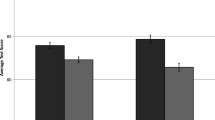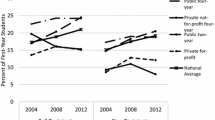Abstract
An experimental “pass-fail” grading system was examined to determine if interdisciplinary exploration was encouraged by modifying the competitive aspects of grading and to examine the performance of students enrolling in pass-fail courses in the light of their past achievement and the performance of classmates. Results of the study suggest that the pass-fail grading situation encouraged study across a wider area of subjects, but also was associated with lower achievement as reflected by a familiar grading scheme. A review of the literature indicated that a need for valid evaluation of student progress is acknowledged by virtually all writers, but that numerous arguments attack the manner in which grades are assigned and used and attack the lack of knowledge about the psychometric attributes of traditional grading arrangements.
Résumé
Un système expérimental de notation “réussite-échec” a été mis à l'étude afin de déterminer si l'on pourrait encourager l'exploration interdisciplinaire en modifiant les aspects compétitifs de la notation et aussi afin d'évaluer le rendement des étudiants inscrits aux cours notés selon système réussite-échec à la lumière des réalisations antérieures de ces étudiants et du rendement de leurs camarades de classe. Les résultats de cette étude laissent entendre que le système en question a encouragé les étudiants à porter leur intérêt vers un plus grand nombre de sujets, mais qu'il s'en est suivi des résultats moins brillants en comparaison des résultats obtenus par le système de notation classique. Une étude de la littérature publiée à ce sujet indique que presque tous les auteurs reconnaissent la nécessité de disposer d'une méthode d'évaluation valable des progrès des étudiants, mais il existe de nombreux arguments contre la façon dont les notes sont accordées et utilisées et contre le manque de connaissance des attributs psychométriques de la méthode de notation traditionnelle.
Similar content being viewed by others
References
Aiken, L. R. Jr. The grading behavior of a college faculty.Educational and Psychological Measurement, 1963,23, 319–322.
Burns, R. L.Graduate admissions and fellowship selection policies and procedures. Part I. Princeton: Educational Testing Service, 1970.
Elbow, P. H., More accurate evaluation of student performance.The Journal of Higher Education, 1969,40, 219–230.
Goodman, P.Compulsory mis-education and the community of scholars. New York: Vintage Books, Random House, 1964.
Hoyt, D. P. College grades and adult accomplishment: A review of research.Educational Record, 1966,47, 70–75.
Hoyt, D. P. Rationality and the grading process.Educational Record, 1970,51, 305–309.
Karlins, M., Kaplan, M., & Stuart, W. Academic attitudes and performance as a function of differential grading systems: An evaluation of Princeton's pass-fail system.The Journal of Experimental Education, 1969,37, 38–50.
Kelly, S. P., & Thompson, R. Grading and the nature of the discipline.The Journal of Higher Education, 1968,39, 517–518.
Mannello, G. Grades must go!Educational Record, 1969,50, 305–308.
Marshall, M. S.Teaching without grades. Corvallis: Oregon State University Press, 1968. (a)
Marshall, M. S. Triangular grading.College and University, 1968,43, 143–149. (b)
Marshall, M. S. Your grades are?College and University, 1969,44, 182–188.
Miller, S. Measure, number and weight: A polemical statement of the college grading problem. Unpublished paper, Academic Senate Select Committee on Education, University of California, Berkeley, 1966.
Milton, O. What it is ... I measure I do not know.Educational Record, 1968,49, 160–165.
Quann, C. Pass-fail—what are the trends?College and University, 1970,45, 484–493.
Raimi, R. A. Examinations and grades in college.American Association of University Professors Bulletin, 1967,53, 309–317.
Rossmann, J. E. Graduate school attitudes to S-U grades.Educational Record, 1970,51, 310–313.
Seawall, F. A quality grading systemCollege and University, 1967,43, 47–51.
Sgan, M. R. The first year of pass-fail at Brandeis University: A report.The Journal of Higher Education, 1969,40, 135–144.
Smith, A. Z. &, Durbin, J. E. Marks and marking systems. In C. W. Harris (Ed.),Encyclopedia of Educational Research. (3d ed.) New York: Macmillan, 1960. Pp. 783–789.
Stallings, W., & Leslie E. K., Student attitudes toward grades and grading.Improving College and University Teaching, 1970,18, 66–68.
Trow, W. C.: Grades and objectives in higher education.Educational Record, 1968,49, 85–91.
Warren, J. R.. Current grading practices. Research Report No. 3, American Association for Higher Education, Washington, 1971.
Westland, G. The philosophy of student assessment.Universities Quarterly, 1969,23, 350–360.
Wilson, K. M. Increased selectivity and institutional grading standards. Unpublished paper, College Research Center, Poughkeepsie, 1966.
Author information
Authors and Affiliations
Rights and permissions
About this article
Cite this article
Reiner, J.R., Jung, L.B. Enrollment patterns and academic performance as a function of registration under a pass-fail grading system. Interchange 3, 53–62 (1972). https://doi.org/10.1007/BF02145943
Issue Date:
DOI: https://doi.org/10.1007/BF02145943




